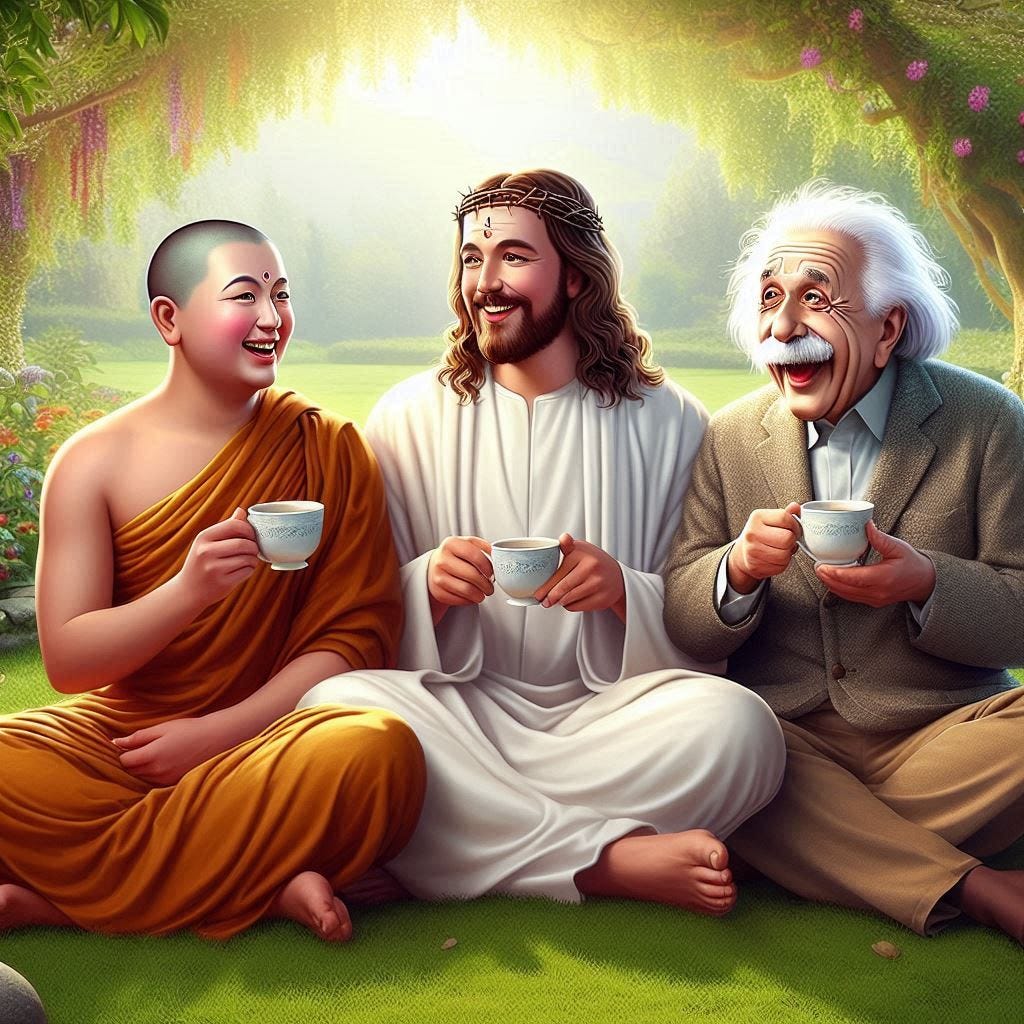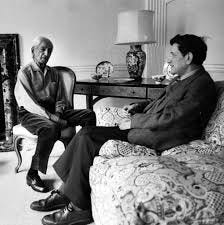(Image courtesty of Microsoft Image Generator)
Buddha, Jesus, Einstein: Rebels with the same cause
Buddha, Jesus and Einstein are among the most seminal teachers whose work has had the greatest impact on human history. I find it fascinating that even though they emerged from very different cultures over a period of two and a half thousand years, their insights share some extraordinary similarities.
I thought it may be stimulating to explore a few of these parallels, and also to offer those of you interested in further exploration, a list of books I have found interesting on these subjects.
Rebels
Probably the most obvious starting point when stepping back from the lives of all three teachers is that they were, each one of them, rebels. Buddha challenged religious orthodoxy, rejecting Brahman rituals in favour of a direct path to enlightenment available to all. Jesus called out the hypocrisy of Jewish authorities of the time, while advocating personal spiritual experience. Einstein challenged Newtonian mechanics, revolutionised physics and pointed to the truth that our experience of reality is entirely subjective.
One anecdote illustrating how Buddha and Jesus were similarly different from the religious hierarchies of their times is the so-called ‘widow’s mite’ story. Both men highlighted the sacrifice and sincerity of the intention of a poor woman who gave from the little she had as being very much more important than the amount she gave. In our society’s lauding of philanthropists and overlooking of the sometimes-extraordinary generosity of ordinary people, this is an insight as relevant today as ever.
Interdependence
All three teachers emphasized interdependence, a concept that goes against our habitual sense that each one of us exists quite separately from the world around us. Because we depend, for the way we exist, on the interaction of many other beings, the most basic implications are clear: ‘Consider others as yourself,’ said Buddha. ‘Do to others as you would have them do to you,’ said Jesus.
I especially like one of Einstein’s most oft-quoted observations on this point. It makes explicit that the belief we exist in isolation is nothing less than a misperception. It also sets out a way to free ourselves from such muddied thinking.
“A human being experiences himself, his thoughts and feelings as something separated from the rest—a kind of optical delusion of his consciousness. This delusion is a kind of prison for us, restricting us to our personal desires and to affection for a few persons nearest to us. Our task must be to free ourselves from this prison by widening our circle of understanding and compassion to embrace all living creatures and the whole of nature in its beauty.”
Ethical behaviour and wisdom
Einstein’s statement, with its uplifting explanation of interdependence, shows how the subject of ethics may be approached, not so much on the basis of belief (“God wouldn’t like it” or “you can’t dodge karma”) but rather with the simple logic that if we are part of an interdependent whole, then in harming others we harm ourselves. Why would we contemplate such a thing? We wouldn’t, unless we don’t perceive, understand or accept the reality of it. If we lack wisdom and live in metaphorical darkness.
The relationship between ethics and wisdom runs both ways. The more accurately we understand reality, the more ethical we are likely to be. The more unethical we are, the harder it becomes to see truth.
Buddha and Jesus both used the same elements of light, lamps, and clarity of sight in describing the relationship between ethical conduct and clear seeing wisdom. Buddha spelt it out quite plainly: “As a man with eyes who carries a lamp sees all objects, so too with one who has heard the Moral Law. He will become perfectly wise.”
Jesus, frequently more allegorical in the way he communicated, put it this way: “Your eye is the lamp of your body. If your eye is healthy, your whole body is full of light; but if it is not healthy it is full of darkness. Therefore consider whether the light in you is not darkness. If then your whole body is full of light, with no part of it in darkness, it will be as full of light as when a lamp gives you light with its rays.”
Along with Einstein’s beautiful words about widening our circle of understanding, I found this quote from his fellow physicist David Bohm which spells out the relationship between thoughts and perceptions – as well as mistaken thoughts and mistaken perceptions: “It is necessary for each one of us to observe his or her own thoughts and feelings and to inquire into them very deeply, without being controlled by them, without defending or justifying them. In this way, the illusions of the ego can be dissolved, and a clearer, more accurate perception of reality can be achieved.”
(David Bohm and Krishnamurti)
It will come as no surprise that David Bohm took a keen interest in meditation and was well known for his dialogue with Krishnamurti. The statement above sounds like a pretty good description of what is sometimes called shamatha meditation, or ‘mind watching mind’ in which we watch thoughts arise, abide and pass until they wear themselves out and we may enjoy a more tranquil clarity. (You may access an explanation on this and guided meditation I have provided right here).
The illusion-like nature of reality
Why is clear seeing wisdom such a big deal? Because we need some level of insight to understand that what we take to be reality is illusion-like. In the Gospel of Philip, Jesus says: “The world is a deception, for it is like a dream in the night. And just as one in a dream thinks they are in reality, while not so, so too it is with the world."
Lamas frequently use exactly this illustration to communicate how, what seems vividly real to us, has all the substance of a dream. Buddha himself said: “Regard this world as a bubble, regard this world as a mirage."
Einstein, meantime, was subversively humorous on the subject, joking about how our ‘passion’ to make sense of reality leads us to an understanding that has no basis in fact: “Time and again the passion for understanding has led to the illusion that man is able to comprehend the objective world rationally by pure thought without any empirical foundations – in short, by metaphysics.” Simply put, he is saying that the reality we mostly believe in is a fairy-tale.
The primacy of mind
Why do all three teachers concur that reality is illusion-like? Because we are, each one of us, creating our own reality. As Einstein put it: “Physical concepts are free creations of the human mind, and are not, however it may seem, determined by the external world.” He was echoing Buddha, two millennia earlier: “All such notions as causation, succession, atoms, primary elements … are figments of the imagination and manifestations of the mind.”
No equally categorical statement by Jesus is recorded. But the idea that reality is mind’s creation is implicit in how he emphasizes that if we wish to experience a divine reality - in his words, ‘the kingdom of heaven’ – it must come from within.
"Jesus said, 'If those who lead you say to you, "See, the kingdom is in the sky," then the birds of the sky will precede you. If they say to you, "It is in the sea," then the fish will precede you. Rather, the kingdom is inside of you, and it is outside of you.'"
It is significant that Jesus referenced what is inside us first. In Buddhism, the reality in which we exist, which is our own, unique projection, is sometimes referred to as our ‘mandala.’ When we have exhausted karma and perfected virtue, such a mandala is described as immaculate, exalted or divine. Our own, personal, kingdom of heaven.
Our true purpose: liberation from the self
If reality is mind’s creation, our most cherished creation of all is the self.
As I explain in a recent post, what gets us into trouble it is not the constantly changing continuum of body-mind parts we label ‘I,’ but an entirely made-up ‘I’ who seems permanent, concretized and existing somehow separately from body and mind – and the reality which is its creation. It is this ‘I,’ this ‘self’ – loosely speaking, our ego – which it is our greatest task to let go of.
Buddha expressed it like this: “With the relinquishing of all thought and egotism, the enlightened one is liberated through not clinging.”
Einstein observes: “The true value of a human being is determined primarily by the measure and the sense in which he has attained to liberation from the self.”
Jesus, who identified himself as representing a transcendent reality, put it in striking terms: “Those who want to save their life will lose it, and those who lose their life for my sake will save it.” Clinging to what isn’t there – the ego – leads to loss but letting go of the illusion-like self enables us to an experience divine reality.
Summary
There are as great a variety of lineages in Buddhism as there denominations in Christianity, not to mention fields of study within quantum science. Why wouldn’t there be? Our minds are infinitely creative.
While differences and conflicts in approach are often the most apparent aspects, what interests me personally is where they converge. What do they agree on? What messages are being conveyed at the deepest level?
Viewed from this perspective I find the degree of coherence to be reassuring. While we all follow our chosen path to the top of the mountain, it is uplifting to know that every millennia or two, when another extraordinary teacher emerges from among us, whatever their context or language, they confirm that we are headed for the same ultimate destination: transcendence, liberation, bodhi, divine reality.
Further reading:
These are some of the books I know and feel confident recommending. If you’d like to suggest others, please add them in the Comments box at the end.
Einstein and Buddha, The parallel sayings Edited by Thomas J. McFarlane
The quantum and the lotus by Matthieu Ricard & Trinh Xuan Thuan
Jesus Budda, The parallel sayings Edited by Marcus Borg
Living Buddha, Living Christ by Thich Nhat Hanh
The good heart, The Dalai Lama explores the heart of Christianity
The gnostic gospels by Elaine Pagels
The wisdom Jesus by Cynthia Bourgeault
Update from The Twala Trust Animal Sanctuary, one of the not for profits you support as a subscriber to this newsletter:
Flowers help to make the world a less scary place. Little Gizmo, an orphaned vervet monkey, is settling in to a new life at Twala.
It is spring in Zimbabwe and there are a lot of baby animals around. Sady, little Gizmo lost his Mum, but he is now being cared for by the volunteering team at Twala.
May all beings have happiness and its causes!









Thank you David for 'feeding' us all with this. I felt as peaceful as little Gizmo with his flower and milk bottle by the end! 🕊️ For me it is also very timely as I'm currently in a season of insomnia; while I'm grateful that I'm learning to accept such testing times without struggle but rather acceptance, nevertheless it is certainly exhausting. Your piece, in a way I can't really articulate yet, seems to be speaking to me of the wisdom of 'letting go' of any rational search for the 'why' of my insomnia but rather the wisdom of embracing it simply because 'it is what it is.' Thanks again 🙏
A very well thought out analysis. Thank you! How wonderful to be rebelliously wise! And thank you for the pictures of gizmo and the caregiver. Putting all their philosophies into action, right there, with that adorable baby. Love wins every hand.